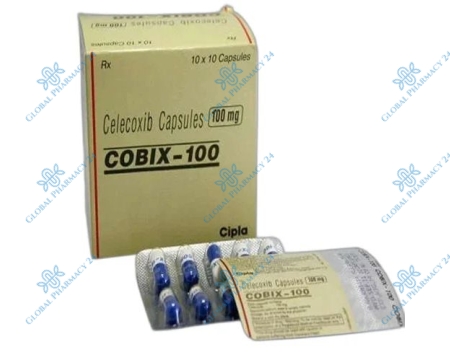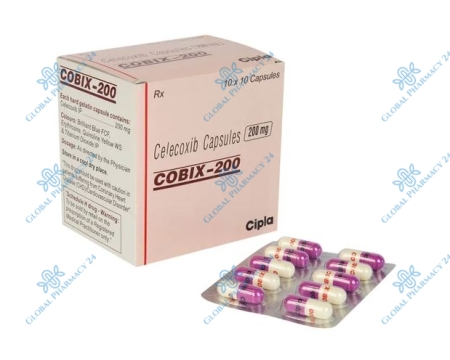| Aspect | Detail |
|---|---|
| Active Ingredient | Celecoxib |
| Dosage Forms | Capsules (100 mg, 200 mg) |
| Duration of Effect | Up to 24 hours |
| Indications | Pain, Arthritis, Menstrual Cramps, Inflammation |
| Pharmacological Class | Nonsteroidal Anti-Inflammatory Drug (NSAID) |
Introduction
Cobix, known for its active ingredient Celecoxib, stands as a significant player in the pharmaceutical market, offering a targeted approach to managing pain and inflammation. As a part of the selective group of NSAIDs, it distinguishes itself by minimizing common gastrointestinal side effects associated with traditional NSAIDs.
Its role extends beyond merely addressing symptoms to enhancing patient quality of life, underscoring its value in therapeutic regimens for various conditions. The following sections delve into Cobix's unique features, efficacy, usage guidelines, potential side effects, precautions, and overall impact in the pharmaceutical realm.
What is Cobix?
Cobix is a prescription medication formulated as a selective COX-2 inhibitor, designed to provide relief from pain and inflammation with a reduced risk of gastrointestinal side effects. It is widely used in the treatment of conditions such as arthritis, menstrual pain, and other inflammatory disorders.
Role of Cobix in the Pharmaceutical Market
In the competitive landscape of pain management solutions, Cobix has carved out a niche for itself by offering an effective alternative that balances efficacy with a favorable safety profile, catering to patients who need long-term NSAID therapy.
The Unique Features of Cobix
Cobix's distinction lies in its selective inhibition of the COX-2 enzyme, which is primarily responsible for inflammation and pain, thereby sparing the COX-1 enzyme that protects the stomach lining. This mechanism reduces the risk of gastrointestinal issues, a common concern with NSAIDs.
Moreover, its chemical composition allows for a longer duration of action, enabling once or twice daily dosing. Patients benefit from its consistent relief without the need for frequent medication intake, enhancing compliance and overall treatment satisfaction.
Celecoxib as the Main Ingredient
The efficacy of Cobix is attributed to Celecoxib, which specifically targets the COX-2 enzyme implicated in the inflammatory process, making it a cornerstone in the management of chronic and acute pain conditions.
The Beneficial Impacts on the Digestive System
Unlike traditional NSAIDs, Cobix's selective action minimizes the risk of ulcers and gastrointestinal bleeding, offering a safer option for pain relief, particularly for at-risk patients or those requiring long-term NSAID treatment.
Efficacy and Benefits of Cobix
Cobix has proven its worth by effectively managing a spectrum of symptoms across different conditions, from arthritis to menstrual cramps. Its targeted approach not only alleviates pain but also significantly reduces inflammation, improving patients' mobility and quality of life.
The broad applicability of Cobix, coupled with its safety profile, makes it a preferred choice among healthcare professionals and patients alike, marking it as a pivotal medication in modern pain management strategies.
Understanding the Mechanism of Action
By selectively inhibiting COX-2, Cobix effectively reduces the production of prostaglandins, substances that mediate pain and inflammation, thus providing relief without adversely affecting the stomach lining.
The Wide Range of Symptoms Cobix Can Address
Cobix's versatility extends to treating various pain-related symptoms, from osteoarthritis and rheumatoid arthritis to acute pain episodes, showcasing its adaptability to different patient needs.
Table: Comparative Benefits of Cobix Versus Other NSAIDs
| Feature | Cobix | Other NSAIDs |
|---|---|---|
| Gastrointestinal Safety | Higher | Lower |
| Duration of Action | Longer | Shorter |
| COX-2 Selectivity | High | Varied/Low |
| Risk of Cardiovascular Events | Needs caution | Varied |
Proper Usage and Dosage of Cobix
Adhering to the prescribed usage and dosage of Cobix is crucial for maximizing its benefits while minimizing potential risks. Personalized dosage adjustments may be necessary based on individual health conditions and responses to treatment.
Understanding the correct administration of Cobix can significantly impact its effectiveness and safety, highlighting the importance of following healthcare professionals' guidelines.
How to Take Cobix?
Cobix should be taken with or without food, as directed by a healthcare provider, emphasizing the need for consistency in its administration to maintain therapeutic levels in the body.
Recommended Dosage and Adjustments
The typical dosage ranges from 100 mg to 200 mg taken once or twice daily, depending on the condition being treated and the patient's overall health profile.
Important Guidelines for Safe Use
Patients are advised to avoid exceeding the recommended dosage, to disclose their medical history and current medications to their healthcare provider, and to monitor for any adverse reactions while on Cobix therapy.
Common Side Effects
Some of the more frequently reported side effects include digestive issues such as dyspepsia, abdominal pain, and nausea, as well as headache, dizziness, and edema. These are generally mild and temporary.
Rare but Serious Side Effects
Rarely, Cobix can lead to serious cardiovascular and gastrointestinal events, such as heart attack, stroke, ulcers, and bleeding. Patients at risk of these conditions should use Cobix with caution and under close supervision.
List: Steps to Take if Side Effects Become Severe
- Contact your healthcare provider immediately.
- Discontinue use until professional advice is given.
- Seek emergency care if symptoms are life-threatening.
- Report any new or worsening symptoms as soon as they appear.
Precautions and Contraindications
Understanding the precautions and contraindications associated with Cobix is crucial for ensuring patient safety. This includes recognizing conditions and medications that may interact negatively with Cobix.
Adherence to these guidelines helps prevent adverse outcomes and maximizes the therapeutic benefits of Cobix, making it an effective tool in managing pain and inflammation.
People Who Should Be Cautious When Taking Cobix
Individuals with a history of cardiovascular disease, gastrointestinal ulcers or bleeding, kidney or liver impairment, and those allergic to sulfonamides should exercise caution when using Cobix.
Medications That Should Not Be Mixed With Cobix
Concomitant use of Cobix with certain medications like warfarin, other NSAIDs, selective serotonin reuptake inhibitors (SSRIs), and angiotensin-converting enzyme (ACE) inhibitors may increase the risk of adverse reactions.
Table: Common Medications and Their Potential Interactions With Cobix
| Medication | Potential Interaction |
|---|---|
| Warfarin | Increased risk of bleeding |
| Other NSAIDs | Increased risk of gastrointestinal side effects |
| SSRIs | Increased risk of gastrointestinal bleeding |
| ACE Inhibitors | Potential reduction in antihypertensive effect |
Conclusion
Cobix represents a significant advancement in the management of pain and inflammation, offering a balanced profile of efficacy and safety. Its selective mechanism of action provides a targeted approach, reducing the risk of gastrointestinal side effects associated with traditional NSAIDs.
By adhering to the recommended guidelines for usage, patients can maximize the benefits of Cobix while minimizing potential risks. Open dialogue with healthcare providers ensures personalized and effective treatment strategies, making Cobix a valuable option for those in need of pain relief.
Recap of Cobix's Advantages and Disadvantages
Cobix offers a unique blend of benefits, including effective pain and inflammation management with a lower risk of gastrointestinal issues. However, attention to dosing, potential side effects, and interactions with other medications is crucial for safe use.
FAQs Cobix
What is Cobix?
Cobix is a pharmaceutical product used for treating various conditions.
What are the common uses of Cobix?
Cobix is commonly used to relieve pain and inflammation associated with conditions such as arthritis.
How does Cobix work?
Cobix works by inhibiting the production of certain chemicals in the body that cause inflammation and pain.
What are the possible side effects of Cobix?
Common side effects of Cobix may include stomach upset, nausea, and headache. Serious side effects are rare but can include gastrointestinal bleeding and liver problems.
Can Cobix be taken with other medications?
It's important to consult with a healthcare professional before taking Cobix with other medications to avoid potential interactions.
How should Cobix be stored?
Cobix should be stored at room temperature away from moisture and heat.





















